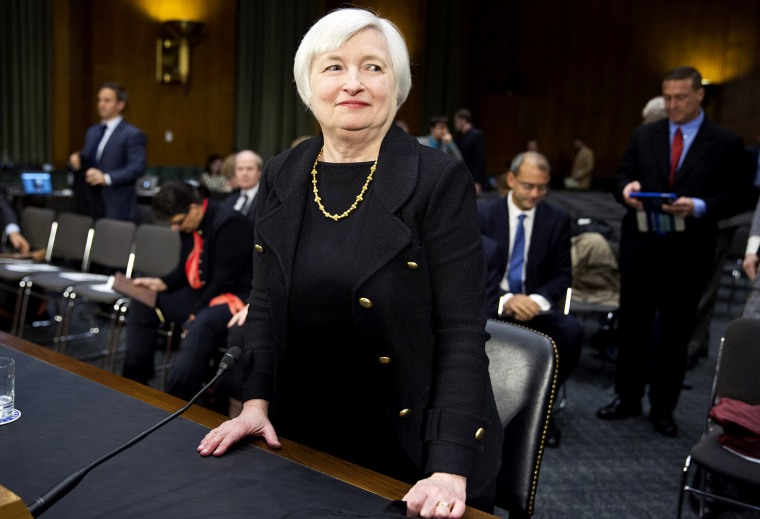Janet Yellen now exerts more control over U.S. economic policy than any woman in history, thanks to a bipartisan Senate vote making her the country's new chair of the Federal Reserve. On Monday evening, the Senate voted 56-26 to make her the country's top banker.
Yellen, who previously served as the vice chair of the Fed under her predecessor Ben Bernanke, will inherit a declining but still relatively high jobless rate. During her confirmation hearings, Yellen indicated that she would continue many of Bernanke's policies in an attempt to bring down unemployment and promote financial stability.
After the vote, President Obama released a statement praising Yellen as "one of our nation's most respected economists" and a "fierce champion" of the American people "who understands that the ultimate goal of economic and financial policymaking is to improve the lives, jobs and standard of living of American workers and their families."
"The way I see it, she's basically a continuity choice after Bernanke, and Bernanke was appropriately concerned about bringing down unemployment," said Josh Bivens, the research and policy director for the Economic Policy Institute.
Yellen is likely to follow in Bernanke's footsteps when it comes to winding down one of the Fed's major post-crash stimulus efforts, called quantitative easing. Late last month, Bernanke announced that the Federal Reserve would slow the rate at which it was purchasing government bonds, and that Yellen would likely continue tapering off the program. Thosee bond buybacks, which are likely to continue at a reduced rate for an indefinite period of time, were intended to keep interest rates low and pump money into the economy.
"I don't think that's going to be a real game changer in vastly slowing down growth in 2014," said Bivens, though he cautioned that it would still act as a "downward thumb on the scale."
Center for Economic and Policy Research co-founder Dean Baker said the taper would have little effect on the U.S. economy, and that Yellen would most likely try to promote full employment through other means.
"She'll probably be the best person at the Fed since the '30s," he said, due to her strong commitment to bringing down unemployment. "I think she's likely to be more aggressive in trying to keep interest rates down even as the economy recovers."
While Yellen's probable loose money approach to governing the Fed has won her support from the left, it has also attracted the ire of the Tea Party right. Sen. Rand Paul, a vocal Yellen opponent, railed against Federal Reserve policy on Twitter hours before the confirmation vote. After reiterating his opposition to Yellen's nomination, the senator went on to blame expansionary monetary policy for the financial collapse.
Baker described Paul's argument as "nonsense," and said easy money had nothing to do with the 2008 financial collapse. To the extent that the Federal Reserve was at fault, he said, it was largely because then-chairman Alan Greenspan did not take the housing bubble seriously.
"They should have tried to crack down on the bubble, but that had very little to do with their interest rate policy," said Baker.
Paul did not speak on the Senate floor before the Yellen confirmation vote. A staff member tweeted that his flight back to Washington, D.C. had been delayed, and it was unclear when he would be able to speak. Instead, Iowa Sen. Chuck Grassley provided the conservative pushback to Yellen on the Senate floor prior to her confirmation.
"The stock market has become addicted to the Fed's easy money policies," said Grassley, who wondered aloud whether quantitative easing would end any time soon.
Sen. Sherrod Brown, D-Ohio, rose to Yellen's defense, urging his colleagues to approve her nomination.
"It's more important than ever that we have strong regulators like Janet Yellen," said Brown, who also emphasized her commitment to reducing unemployment.
Terry O'Neill, president of the National Organization for Women, praised Yellen in a statement released shortly after she was confirmed.
"The U.S. Senate today made history by voting to confirm Janet Yellen as Chair of the Federal Reserve," she said. "Practically one hundred years to the day from when the Federal Reserve was created, the central bank finally has its first woman president. It's about time."
